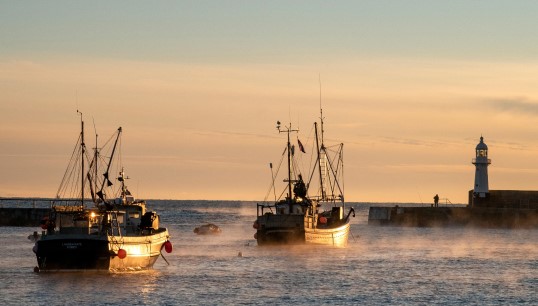Nautilus calls for end to employment loopholes that allow exploitation of fishers
26 November 2024

Nautilus International has joined with other maritime and workers' rights organisations in calling for the UK government to stop the exploitation of fishers through the Employment Rights Bill, which is currently at the committee stage in the House of Commons.
In a letter to home secretary Yvette Cooper – signed by Nautilus International, Focus on Labour Exploitation (FLEX), the International Transport Workers' Federation (ITF) Fisheries Section, the Ethical Trading Initiative, Stella Maris and The Seafarers' Charity – the organisations lay out the appalling conditions often faced by migrant fishers and explain exactly how to prevent these abuses.
'The previous government's failure to proactively ensure that the work migration routes they have established do not facilitate or safeguard against slavery and forced labour has created a situation where we will continue to see systemic violations of fishing workers until robust action is taken,' the letter states.
'Creating a work migration framework which ensures that migrant fishers can access employment rights in practice will drive up standards for all workers, ensure national and international compliance, and safeguard the future of the fishing industry. The misuse of the Seafarers Transit Stamp means that migrant fishers are left with insecure migration status. This leaves workers vulnerable to labour exploitation, even if they are living on UK-flagged fishing vessels in UK ports and working for UK companies that sell into the UK supply chain, because fishers are criminalised by their irregular immigration status, meaning they are working in breach of the UK immigration rules. This leaves them entirely reliant on their employer, and unable to come forward to authorities for protection or support.
'As a coalition of organisations working with and for the interests of migrant fishers, we ask this government to take advantage of the opportunity to address the risks of labour exploitation that persist in the UK fishing industry.'
The ITF estimates that there are around 2,000 migrant workers in the UK fleet who are recruited via the Seafarers Transit Stamp, and are therefore excluded from UK employment protections, minimum wage guarantees and access to social security. Furthermore, accidents are not reported and compensation for injury or loss of life is not enforced.
To address these challenges, ITF-affiliated trade unions have called for a mandatory Fishers Welfare Charter (to mirror the Seafarers Welfare Charter), plus sectoral bargaining for employed workers in the UK fishing sector.
In their letter, the signatories have also laid out a ten-point plan for the UK government:
- Conduct a formal review of the use of the Seafarers Transit Stamp for recruiting migrant fishers from outside the European Economic Area (EEA) to work on UK flagged fishing vessels that are owned and operated by UK companies
- Collect and publish statistics on the use of the Seafarers Transit Stamp for UK fishing vessels that fish exclusively outside UK territorial waters
- Conduct a formal review of the skilled visa worker requirements, its inclusion on the Immigration Salary List, and its practical applicability to migrant fishers working on UK fishing vessels, with attention given to English-language and safety standards for migrant fishers
- Establish a cross departmental advisory group to work with civil society to address the risks faced by migrant fishers
- Provide clear guidance and enforcement powers regarding International Labour Organization (ILO) Conventions 188 (the Work in Fishing Convention) and 190 (the Violence and Harassment Convention) in the UK fishing sector
- Ensure all migrant fishers on the Seafarer Transit Stamp have the same rights and protections (including wages) as those on Skilled Worker visas. This should apply universally, regardless of where vessels operate, as these workers live and work in UK ports on UK flagged fishing vessels
- Ensure labour market enforcement in UK fishing and that the UK national minimum wage and working time directives are applied on all UK-flagged vessels, and ensure adequate powers, strategies and resources are in place
- Review the regulation and licensing of recruitment agencies bringing migrant fishers into the UK
- Ensure that the forthcoming Fair Work Agency is accessible to migrant fishers in practice, and provided with robust enforcement powers which enable them to protect and support fishers
- Introduce a bridging visa such as Australia's 'Workplace Justice visa', enabling migrant fishers who have been exploited to take claims against employers
'These reforms are essential for creating a fair and sustainable fishing industry that respects workers’ rights, while providing assurances to producers, retailers and consumers that the seafood they enjoy is free from exploitation,' the letter states.
'We ask the government to use the significant opportunity of the Employment Rights Bill to introduce these measures in the interests of fishers and UK industry. To deliver these changes, we recommend the establishment of a cross-governmental advisory group, where civil society organisations and trade unions can provide expert input on the measures needed to end exploitation in the fishing sector.'

What is the UK Employment Rights Bill?
The Institute of Employment Rights (IER) has put together a handy resource hub including a briefing on what the Bill proposes, what it considers are 'worrying trapdoors', suggested amendments, and other resources on the Employment Rights Bill (ERB) 2024.
Images: Getty Images
Tags
